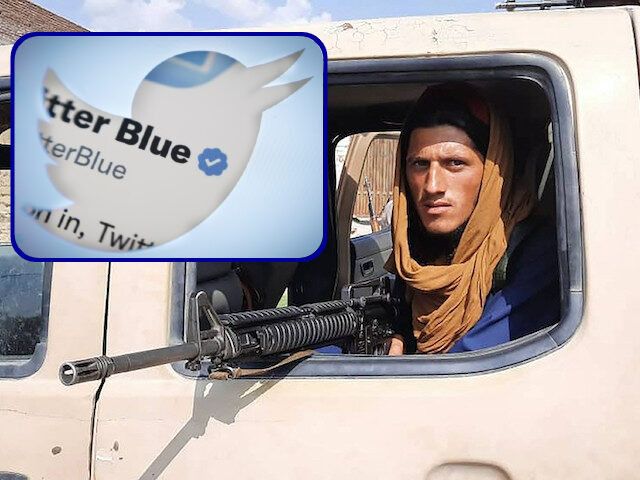The BBC verified on Monday the sudden emergence of blue checkmarks on the accounts of at least two senior Taliban terrorists, a former verification mark now available to anyone on the platform for $8 a month. By Tuesday, the checkmarks had disappeared.
The Afghan Taliban, a Sunni jihadist terrorist organization, is currently operating as the uncontested government of Afghanistan. No state actor has recognized the Taliban as the official government of the country and the United Nations has not offered it a seat representing Kabul, but no other group has posed a serious challenge to its proclamation that it would govern the new “Islamic Emirate of Afghanistan” as of August 2021. Taliban terrorists overran the capital on August 15 of that year after leftist President Joe Biden extended the 20-year-old American war in that country from a previously agreed-upon deadline of May 2021, prompting Taliban leaders to abandon a deal with Washington and launch a conquest campaign against the government of then-President Ashraf Ghani.
Ghani, who fled Kabul via helicopter on August 15 after hearing Taliban leaders had reached city limits, still claims to be the president of Afghanistan but has no tangible power in the country. He remains exiled in the United Arab Emirates (UAE) as of press time.

Taliban fighters take control of Afghan presidential palace in Kabul, Afghanistan, Aug. 15, 2021, after President Ashraf Ghani fled the country. (Zabi Karimi, File/AP)
In an apparent attempt to affirm their legitimacy as leaders, at least two Taliban officials appear to have paid for blue checkmarks on Twitter. The BBC reported on Monday that Hedayatullah Hedayat, a Taliban “information access” head, and Afghan Information Ministry official Abdul Haq Hammad had blue checkmarks on their accounts as of Monday. Both appeared to be subscribed to Twitter Blue, a program in which anyone can pay $8, or $11, a month for increased visibility on the site and the verification icon.
Neither appears to have published overtly violent content at press time, though Hedayat published a video featuring an alleged Islamic cleric explaining the benefits of the Taliban’s “Islamic political system” on Tuesday.
داسلام سیاسي نظام
د درسونو لړۍ پنځم درس
مدرس: شیخ عبدالسمیع غزنوي (حفظه الله)
دا لړۍ جریان لري !https://t.co/RezynvS5BX pic.twitter.com/rprXqCQsrl— هدایت الله (هدایت) (@Hedayatullah111) January 17, 2023
The BBC also identified four accounts of “supporters” of the Taliban who had purchased blue checkmarks, giving them an appearance of authenticity. Both accounts of the Taliban officials, however, were much more prominent, boasting nearly 200,000 followers each.
Prior to automobile magnate and space exploration celebrity Elon Musk purchasing Twitter, blue checkmarks were used to verify the authenticity of accounts that Twitter officials deemed to be of sufficient public importance. Twitter previously issued checkmarks to its preferred accounts with no official process, struggling for years to explain the reasoning behind verification and enduring several embarrassing episodes of fake accounts and “bots” receiving blue checkmarks.
The new program, “Twitter Blue,” allows individuals to simply purchase the checkmark, meaning it no longer indicates that Twitter itself has deemed an account noteworthy. Musk rolled out the for-purchase regime late last year but was forced to suspend it temporarily after purchasers used the program to set up accounts in the names of public figures and mock them. The program relaunched in December with upgraded identity security features; changing the name or profile photo on the account results in the loss of the checkmark.
The Taliban present an entirely different problem for Twitter, however: authentic accounts run by powerful politicians and religious influencers, publishing content accurately representing the people they claim to represent, but promoting violent jihadist content or propaganda meant to increase support for a jihadist organization, regardless of the violence factor.
Prior to Musk’s takeover of Twitter, and immediately after the Taliban’s takeover of Afghanistan, the company affirmed that Taliban jihadists, longtime avid users of the platform to spread Islamist propaganda, could keep their accounts so long as they did not publish posts including the “glorification of violence, platform manipulation and spam.”
“The situation in Afghanistan is rapidly evolving,” a Twitter spokesperson said at the time. “We’re also witnessing people in the country using Twitter to seek help and assistance. Twitter’s top priority is keeping people safe, and we remain vigilant.”
Musk has not publicly changed the rules regarding Taliban terrorists at press time.
As of Tuesday, Hedayat’s and Hammad’s accounts do not have blue checkmarks on their profiles. Neither account appears to have mentioned acquiring or losing the checkmarks. Twitter employees have not clarified the situation at press time. Another account – belonging to Ahsan Ullah, a deputy director at the Taliban’s Ministry for Economic Affairs – does possess a blue checkmark at press time.
“This account is verified because it’s subscribed to Twitter Blue,” Ullah’s account reads. His recent posts include propaganda advertising the Taliban’s new alleged luxury vehicle, the “Mada 9,” which reports indicate is a “modified Toyota Corolla engine” built into what looks like a sports car. Taliban jihadists have enthusiastically posted videos and photos of the allegedly indigenously developed car, but no information on if or when it would become available for purchase.
INTO THE WHITE pic.twitter.com/iUne67WJRy
— Ahsan ullah "Ahrar" (@ahsan1995w) January 15, 2023
The Taliban are far from the first jihadists to employ social media, and specifically Twitter, to publish propaganda to their benefit. The Islamic State, one of the world’s most gruesomely violent jihadist organizations, pioneered the use of content not directly related to sharia to promote itself with the Twitter account @ISILCats, which posted pin-up style photos of its young jihadist men posing with kittens and cats, often also wielding machine guns and other weapons of war. Twitter launched a campaign to erase thousands of such accounts promoting radical Islamist content in 2016.

COMMENTS
Please let us know if you're having issues with commenting.